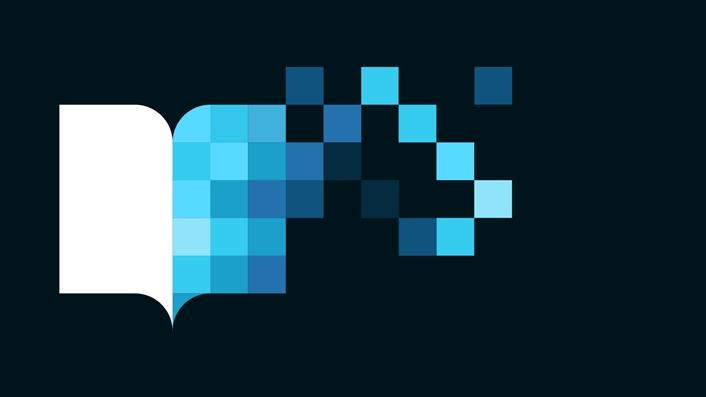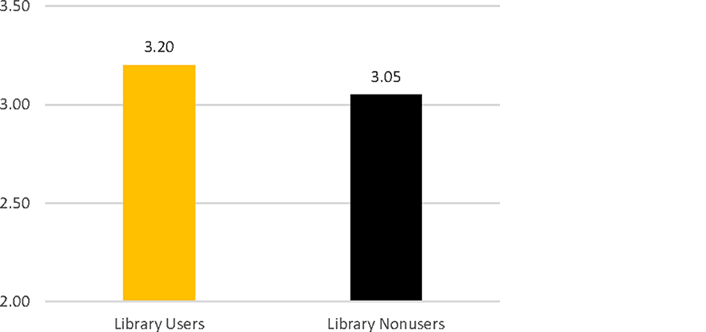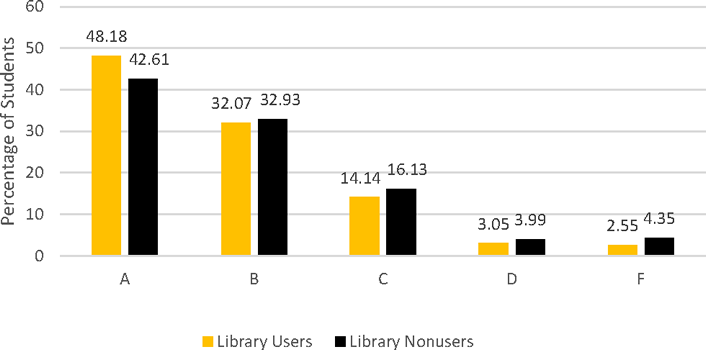
As higher education institutions deploy learning analytics platforms to better optimize student learning, the question of what data are collected and in which contexts arises. To fully understand the total student experience, data about student interactions with rec and wellness centers, student support services, and certainly academic advising centers are being collected and analyzed as they're added to the traditional classroom attendance and engagement model.
Yet, when institutions look at potential factors that might impact academic success, libraries may be overlooked.
Library Use and Student Success Research
The 2010 release of The Value of Academic Libraries — prepared by Megan Oakleaf for the Association of College and Research Libraries (ACRL) — led to a reinvigorated environment for research into how academic libraries support student success. In the report, Oakleaf calls on librarians to demonstrate "the value of academic libraries in clear, measurable ways" by investigating the impact of library services on student grades and retention. Consequently, as a part of its Plan for Excellence, ACRL established the goal that "academic libraries demonstrate alignment with and impact on institutional outcomes."
Since then, a number of large-scale studies have reported that students who use the library consistently have improved academic outcomes than students who do not use the library. Among them are Soria, Fransen, and Nackerud, who reported that University of Minnesota students who used the library had an average semester GPA of 3.18 compared to an average GPA of 2.98 for nonusers; Cox and Jantti, who found that average scores for students at the University of Wollongong increased as student interactions with the library increased; and Stone and Ramsden, who also found a positive correlation between library use and student attainment in research conducted across eight U.K. universities.
Student Success as (a State and) an Institutional Priority
Concurrently — and not unlike at many other institutions — student success has been identified as an institutional priority at the University of Central Florida (UCF). Our Collective Impact Strategic Plan [https://www.ucf.edu/strategic-plan/files/2017/07/Creating-Our-Collective-Impact.pdf] identifies several student success metrics, including first- and second-year retention, graduation rates, and time to graduation. The six-year graduation rate and second-year retention rate also are two of the key metrics put forth by the Florida Board of Governors Performance Funding Model.
UCF's commitment to student success is demonstrated by its participation in a number of initiatives dedicated to improving academic outcomes, among them the AASCU Re-Imagining the First Year of College, the John N. Gardner Institute Foundations of Excellence, the Education Advisory Board's Student Success Collaborative (EAB SSC), and the University Innovation Alliance. The provost also has identified student success as a priority. At a 2017 campus forum dedicated to the topic, he presented a shared philosophy that student success must inform everything from the way we teach to the units we work with and that our individual efforts must be aligned to strengthen our impact. He also identified several goals, including increasing retention rates of first-year students, and went on to mention that retaining even as few as 40 more first-year students (at a campus of 65,000) could bump UCF's scores on the retention metric as defined by the Florida Board of Governors.
Library and Student Success Research at UCF
The institutional emphasis on student success, combined with the call from ACRL to demonstrate the library's value, has led UCF librarians to undertake research similar to the aforementioned studies. We began collecting student IDs at five library service points at the onset of the fall 2014 semester. Results of analyses of student interactions from fall 2014 through fall 2015 (consisting of 25,336 unique students, roughly 40% of the population) were comparable to reports from other studies — we likewise found that library use correlated to higher average semester GPAs.
At UCF, library users enjoyed an average semester GPA of 3.20 compared to library nonusers, who averaged 3.05. We also saw a trend in distribution of grades, with 48.18% of library users receiving A grades compared to 42.61% of library nonusers, and nonusers received more B, C, D, and F grades (see figures 1 and 2).


Library Student Data and Campus-Wide Learning Analytics Initiatives
There is a growing body of evidence that library use positively correlates with student success, yet Oakleaf, Walter, and Brown concede that academic libraries typically do not contribute student interaction data to campus-wide learning analytics efforts. Certainly, constraints abound. It may be difficult to implement the recommendations from these studies, given that many libraries do not fall under the same organizational umbrella as academic advising, tutoring, and other student support services. To ameliorate that situation, university administrators and institutional effectiveness units may need to take a more holistic view of potential student data points.
Also, it can be challenging to collect student interaction data in libraries. Some units that contribute learning analytics data to campus-wide efforts often do so based on only one interaction point, such as card-swipe data at an entry point. Students can interact with libraries at multiple points, ranging from the use of space to materials to services. Finally, some library interactions are not authenticated and require human intervention to collect and ensure quality.
Despite these challenges, the logical next step for academic libraries that collect student data is to move beyond correlation results and contribute to institutional learning analytics initiatives. In an October 2017 blog post focusing on the role of student advising and services in increasing student retention and degree attainment rates, Millichap and Dobbin suggested that a single point of contact is optimal. Building on this idea, mining a central repository of learning data could provide an expanded understanding of student behaviors that impact academic outcomes.
UCF Learning Analytics Collaborations with the Library
At UCF, the library is contributing student data to the EAB Student Success Collaborative (in kiosk mode) and is working with our institutional effectiveness unit, Institutional Knowledge Management (IKM), to "institutionalize" the data-collection and analysis process. We began entering student information into the EAB SSC platform about a year ago and will work with the administrators to mine data, identify courses that have high DFW rates and have a library research component, and arrange interventions with faculty or student services partners.
As we continue to work with IKM, our next objective is to build an interactive visual data dashboard that will allow us to drill down by various student academic and demographic variables; this will complement existing analytics dashboards. These collaborations build on each unit's respective strengths. IKM and the SSC are well versed in maintaining student privacy and have in-depth knowledge of learning analytics. Both have coordinated campus-wide student success efforts. The library has identified multiple interaction points and is committed to ensuring that student interaction data will continue to be collected and contributed.
Goals of the Project
The time devoted to this initiative has been substantial, and certainly we would not be where we are without the interest and support of our institutional effectiveness unit, IKM. But the visual dashboard is not the culmination of the project; it is the beginning. We believe that these data can lead to proactive interventions that have strong potential to improve student academic outcomes.
Remember the comment that the provost made about retaining a figurative handful of first-year students? Ultimately, we hope to be able to identify the at-risk students who would benefit from an "academic bootcamp" and collaborate with campus partners to provide intensive training on topics such as effective studying and test taking, writing for academic purposes, and using library resources for course assignments. Assuming activities like these are impactful, we will reallocate resources — and advocate for additional support — to further align library services to student success goals defined by the institution.
Penny Beile is Associate Director of Research, Education, and Engagement at the University of Central Florida Libraries.
© 2017 Penny Beile. The text of this work is licensed under Creative Commons BY-NC-SA 4.0.
